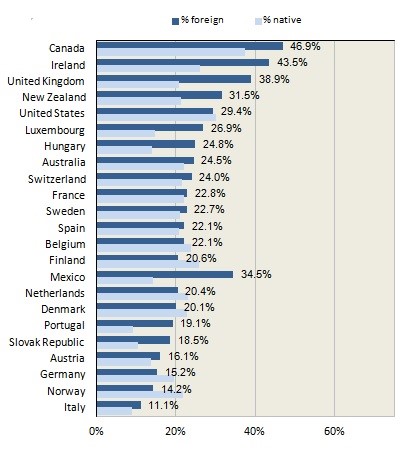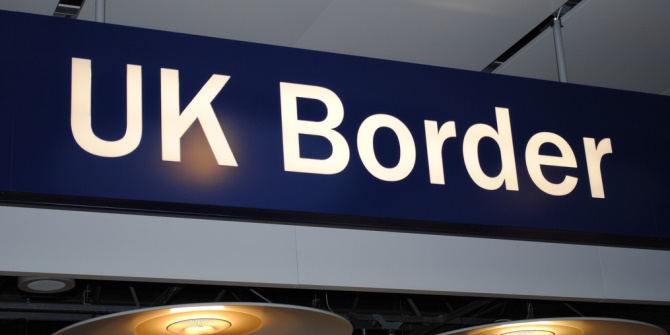 What impact would Britain leaving the EU have on UK immigration policy? Jonathan Portes writes that exiting the EU would not be a magic solution to immigration problems. For a start, the UK would have to accept an exit from the single market and make alternative plans. He argues that difficult policy questions would still remain, as recent data debunk the myth of unskilled migrants flocking to the UK from other EU member states. Furthermore, less migrants from the EU might ‘make room’ for migrants and refugees from non-EU countries.
What impact would Britain leaving the EU have on UK immigration policy? Jonathan Portes writes that exiting the EU would not be a magic solution to immigration problems. For a start, the UK would have to accept an exit from the single market and make alternative plans. He argues that difficult policy questions would still remain, as recent data debunk the myth of unskilled migrants flocking to the UK from other EU member states. Furthermore, less migrants from the EU might ‘make room’ for migrants and refugees from non-EU countries.
Last month’s immigration statistics showed net migration to the UK rising to 330,000 last year, a record – and far in excess of the government’s “aspiration” (downgraded from a “target”) to reduce migration to the tens of thousands.
Net migration from within the EU, at 183,000, has been largely responsible for the recent rise. Substantial net migration from within the EU to the UK is is a recent development. Free movement was one of the founding principles of the EU, but only in the last decade – when central and eastern European countries joined the Union in 2004 – has it become of major economic and social significance.
While non-EU migrants still outnumber those of EU origin within the resident population, an increasing proportion of new arrivals (especially those coming to work rather than study) is from elsewhere in Europe.”
Not surprisingly, then, politicians who favour “Brexit” say that only leaving the EU would enable the UK to restore “control over our borders” and reduce migration. Ukip, for example, say that after leaving the EU they would introduce an “Australian-style points system” – an “ethical visa system for work and study, based on the principle of equal application to all people”.
The question of what EU exit could or should mean for immigration to the UK will be central to the referendum campaign.
The first point to note is that leaving the EU does not necessarily mean ending free movement, and hence large-scale, “uncontrolled” migration from elsewhere in the EU.
If we wanted to preserve access to the EU single market – as many of those who favour exit say they want – then the most obvious way to do so would be for us to join Norway (and Iceland and Liechtenstein) as members of the European Economic Area. But free movement actually applies to EEA members on pretty much the same basis.
Alternatively, we could emulate Switzerland, and negotiate bilateral agreements for market access. But not only do the Swiss have far more EU migrants than us, when they recently voted in a referendum to impose quotas, the EU told them bluntly that that wasn’t acceptable. Faced with the prospect of being (effectively) kicked out of the single market, the Swiss are thinking again.
So to genuinely go it alone on immigration policy might well require not just Brexit but an acceptance that we would be excluding ourselves from the single market. And even then we would almost certainly have to negotiate some bilateral arrangements with EU countries – if only to safeguard the position of the large numbers of EU nationals already here (we’re hardly going to deport them) and UK citizens in other European countries (repatriating large numbers of pensioners from Spain is equally impracticable).
But, supposing this could be achieved relatively painlessly, what would our new immigration policy look like? Ukip’s talk of an “Australian-style points system” begs more questions than it answers. In fact, as far back as 2008, the then government claimed that this was exactly what it was introducing. As Randall Hansen points out, the countries with fully-fledged points systems (Canada and Australia) introduced them as a way of targeting growth in both overall population and human capital; higher immigration is not necessarily the objective of those who want us to leave the EU.
That said, there is no doubt that, if we were no longer part of the EU free movement area, a sensible immigration policy would look quite different to current policy. There would be no rationale for, as we do now, offering completely free access to the UK labour market for workers, skilled or otherwise, from Bulgaria or Belgium, while imposing tight restrictions on even highly skilled workers with a job offer or scarce skills from India or Indonesia.
A new policy: answering difficult questions
First, would the new system be more generous to non-EU migrants than the current one? That is indeed what some opponents of free movement imply – for example Migration Watch here, saying fewer Europeans would “make room” for Syrian refugees, or Ukip here, making rules “fairer for the Commonwealth”. But this seems disingenuous at best.
Hitting the “tens of thousands” target would require both a very substantial reduction in EU migration and a further reduction in non-EU migration.
So either the new system will have to be just as restrictive towards Syrian refugees or Commonwealth doctors as the current one, or net migration will still remain at historically very high levels – not as high as at present, but still well above the government’s target. And now there would no longer be a convenient excuse for not hitting it.
Second, would we really ban unskilled migration for economic reasons entirely? At least in theory, it is possible to make a plausible economic rationale for doing so; while this would cut growth in the short term, it might over time incentivise firms into productivity-enhancing investment or training.
But these effects are lengthy and uncertain (and not obvious in previous periods of low migration). Meanwhile, business would suffer and would be vocal in saying so. And the incentives for irregular migration would increase significantly (remember that the vast majority of irregular migrants come to the UK perfectly legally and stay on – it is not primarily a question of border control).
Third, would a new system actually be an improvement on the current one, in terms of economic outcomes? Although our system is far from perfect or optimal in an economic sense, all the evidence suggests it has delivered surprisingly positive outcomes over the last two decades.
There is little or no evidence of negative impacts on jobs or average wages, and only small wage impacts even for low-skilled workers; productivity impacts are likely to have been positive; and, perhaps most surprisingly, despite the fact that most immigrants are not selected by skill, the UK does remarkably well in attracting skilled migrants. As this chart shows, immigrants to the UK are considerably more likely to be highly educated than either natives or migrants to other countries.
Chart: Proportion of natives and migrants with tertiary education
 Source: OECD
Source: OECD
So leaving the EU might – or might not – increase our degrees of freedom in immigration policy. But it would be no magic bullet – difficult policy questions would still remain.
Note: Featured image credit: Ωριγένης / Wikimedia Commons (CC BY-SA 4.0). This article was originally posted on the UK in a Changing Europe website.
 Jonathan Portes is NIESR Fellow and Senior Fellow at The UK in a Changing Europe.
Jonathan Portes is NIESR Fellow and Senior Fellow at The UK in a Changing Europe.








BRITAIN NEEDS TO COME OUT NOW,before we end up like Greece ,Merkel is destroying Europe.
Reply to C Watts:
You are missing one huge thing – How many EU migrants chooses UK Citizenship to live permanently here? And how many non EU??
After Brexit immigration won’t change – there just be less EU nationals in it 🙂
And regarding NHS and housing: Brits have many times less hospitals and houses per head, than many civilised countries. Quality of life in UK really sucks, not mentioning the weather!
Source (NHS):
http://data.worldbank.org/indicator/SH.MED.BEDS.ZS?order=wbapi_data_value_2011+wbapi_data_value+wbapi_data_value-first&sort=desc
And (HOUSING):
https://en.wikipedia.org/wiki/List_of_countries_by_home_ownership_rate
Can’t be that bad?Alot of people want in dear.
Mass deportation of those who use EU passports as a work permit would be subject to deportation after Brexit. That is the whole point of the exercise. They would have to apply for a work permit at the British Embassy in their country of origin. Our housing problem will be gone, houses will be become affordable, services will no longer be overloaded and work would be in abundance for our unemployed to be forced into work. We cant deport our own underclass but we can deport those who take the jobs they should be doing.
Watts, I’m afraid I do not agree with your comment. Your conclusions are based in the fact that “massive deportation” of EU migrants living in the UK will take place when the article is stating that a consensus has to be reached first. An agreement that sets up the terms for EU migrants here to SAFEGUARD their stayence, not to deport them… If that happens then, all the britons abroad could face deportation likewise and the government will have to cope with angry english pensioners that lived abroad.
Now, referring back to the article, Britain, in the aftermath of a brexit, could lower its barriers of entry for non eu migrants since – and this is not stated in the article – this country needs migrant workers. Do you seriously think british citizens, underclass britons to be exact, would be willing to work as cleaners/waiters/housekeepers? They would rather preffer not to work and receive their “fair” share from the welfare system. If deportation happens, aggregate demand will go down in the short run and massive deflation will take place.
And we will lose the money they pay in taxes and that they spend on goods and services. Meaning the economy will shrink, meaning more austerity measures, prices going up rather than down, inevitable tax rises for everyone. A return of visas for us to travel in Europe. We will all be much poorer. What a lovely, deluded world you live in, what is it called, Balamory???
Think very carefully before you gaily deport all those EU migrants. All that space you will have created will quickly be taken by all the Brits currently living in Europe (1.2 million). Many, indeed most of these are the elderly who would require frequent medical services. A huge strain on our already struggling NHS. Or do you think that you can kick out migrants but the EU in its infinite compassion will continue to allow UK nationals to work, live, study and avail themselves of all free services without a quid pro quo. Get real. This is Trumpism.
I don’t find there to be a necessarily bad argument being made here regarding the past; the problem is that future migration patterns, based upon the current trend of war in Arab and North African countries, is seriously disturbing to the British national interest…The truth is that EU immigration policy is has been very beneficial for the UK thus far; the problem is of course that the new wave of migrants is not necessarily a wave of migrants (as it is de jure) but a wave of settlers that seem to have few plans to return to their home countries any time soon. If the Muslim migrants do in fact settle and not integrate themselves into British culture as many seem so far to have failed in doing, then the future of the country will be thrown into doubt. The question then becomes, can a Brexit offset this major threat or not? In terms of immigration, it certainly can as we could not just allocate more room for immigrants from outside the EU, but also reduce the amount coming in from the Middle East and Northern Africa. This would allow for a more proportional reallocation that might favour immigrants with better skills from North America, especially the US, where tens of thousands of highly educated professionals are also seeking to move abroad and might now consider the UK as their destination of choice. Perhaps such a move would be preferable to us than having hundreds of thousands of culturally different and much more religious, possibly radicalised Muslims moving into ghettoised neighbourhoods. Let us hope it never comes to that.
Absolutely, we’ll get lots of articles like this from the pro-Europe lobby, but it’s all skewed in their own self interests and political beliefs aimed at trying to scare the British public into voting to stay in the EU. I just laugh at them, and remain committed to voting ‘No’ or ‘Leave’ as it’s now been worded.
The Islamic invasion that will soon bring blood to the streets of Berlin and parts of Western Europe can only be prevented from gaining access to Britain by voting to ‘LEAVE’ the EU and giving us back control of our own borders.
OK, let me get this straight, accepting the return of “UK citizens in other European countries (repatriating large numbers of pensioners from Spain is equally impracticable)” is impossible.
Accepting the arrival of millions of Third World settlers, meantime, is not merely possible, but desirable.
No wonder the UK is voting “out”.